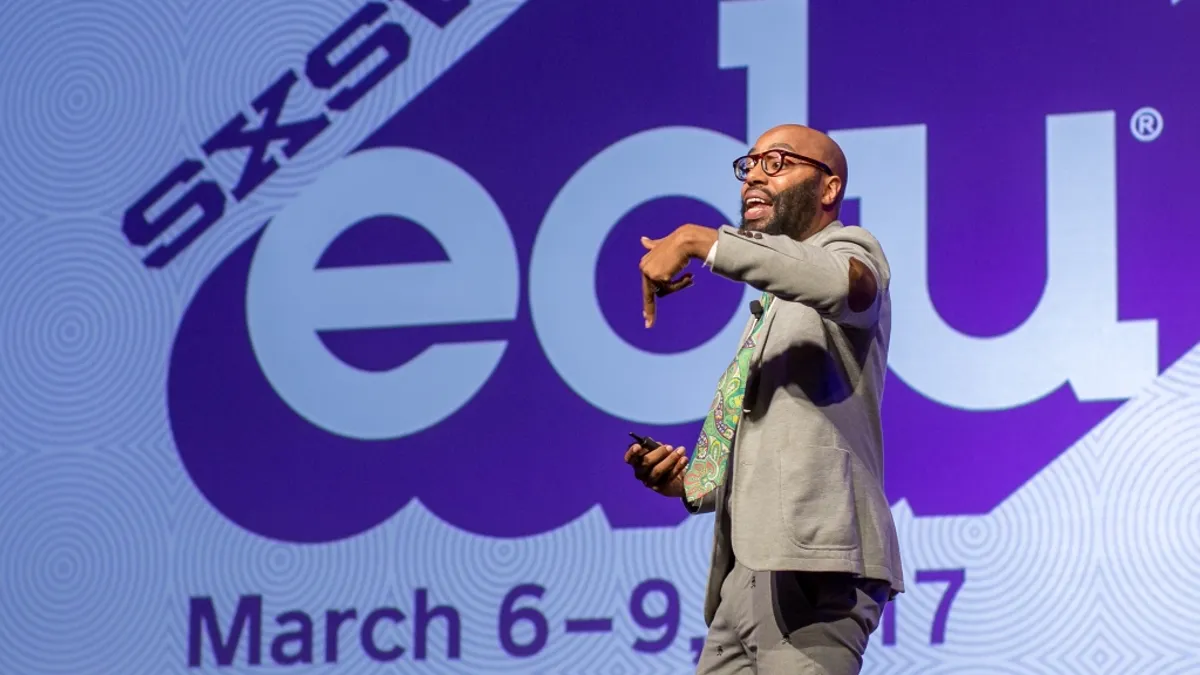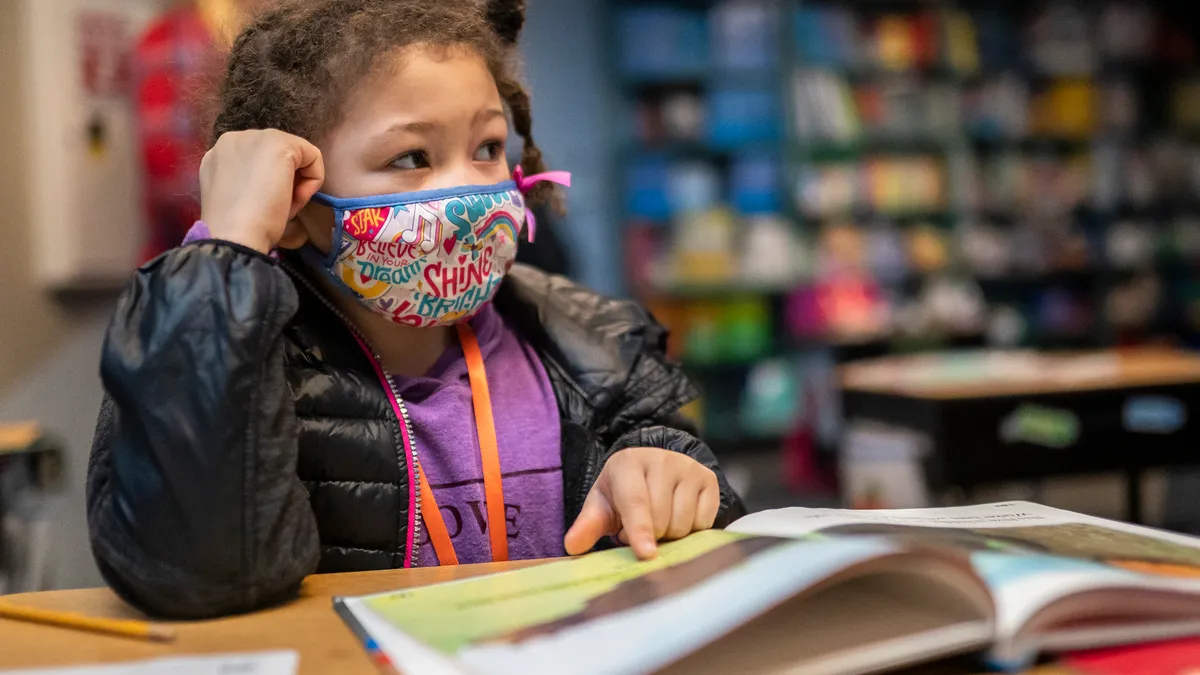SXSWedu Executive Producer Ron Reed kicked off the 2017 edition of the conference and festival Monday morning in a crowded ballroom D at Texas’ Austin Convention Center, highlighting a massive 1,300 sessions and workshops proposed by its community during the crowdsourcing process this year. In his introduction of opening keynote speaker Christopher Emdin, he highlighted 70% of respondents in a pre-conference survey considering the intersection of culture and learning as “pretty important.”
Emdin, an associate professor in the Department of Mathematics, Science and Technology at Teachers College, Columbia University, opened by joking, “Y’all’s energy’s not lit enough. I’ll explain what that means in a moment.” He went on to note that there are three types of attendees at the show: those who understand that education is the Civil Rights issue of our time, those who come solely to pitch their new product or pitch things to schools and others, and those who are stuck somewhere between with the ideology of the former and the execution of the latter.
His keynote, titled “We Got It from Here...Thank You 4 Your Service,” he focused on the extraction of culture from the learning experience. Using an analogy with the most recent A Tribe Called Quest album and its title’s underlying message about the corporatization of the hip-hop genre, he said that, at some point, people must look at the second group of people mentioned above and say, “We’ve got it from here, thanks for your service.” Emdin also drew comparisons between the ceremonial forced extraction of teeth from children in the Dinka tribe and the forced extraction of culture from the educations of underserved populations.
Engaging in conversations with young people doesn’t cost a million dollars, Emdin added, while discussing how too much ed tech doesn’t focus on the underlying pedagogy necessary to reach a variety of student populations. For more from Emdin, check out his New York Times best-seller “For White Folks Who Teach in the Hood... and the Rest of Y'all Too: Reality Pedagogy and Urban Education.”
Are teachers the greatest untapped innovation engines in districts?
In a panel moderated by The Teacher’s Guild Director Molly McMahon, Spring Branch Independent School District Associate Superintendent Elliott Witney, El Paso Independent School District Superintendent Juan Cabrera, and Gwinnett County Public Schools Teacher of the Year Valerie Lewis discussed their first-hand experiences with teacher-driven innovation.
The primary takeaway: That administrators should empower teachers rather than take power away from them, and that it’s on the administrators to feed teachers’ passions. As Cabrera said when asked how he’d invest a hypothetical $1,000 to foster teacher innovation, he’d ask his teachers for feedback on how to invest the money rather than just making top-down decisions. One way that could be accomplished, perhaps, is via Lewis’ suggestion of ensuring that a teacher advisory counsel has a seat with the administrative team in weekly meetings.
Check back as we continue rolling out SXSWedu coverage over the coming week for a more in-depth look at this session.
K-12 education is slow to change, but why?
An early afternoon panel moderated by McGraw-Hill Education U.S. Group President Peter Cohen saw Miami-Dade County Public Schools Superintendent Alberto Carvalho, CoSN CEO Keith Krueger, and Teacher International Trainer Catlin Tucker discussing the slow rate of change in America’s K-12 education system.
In all, the slow crawl of progress was ultimately chalked up to a combination of policy mandates (and fights over them) at the federal and state levels stifling innovation at the local level, too much comfort with the status quo, and obsessions with assessments and international rankings. All parties agreed that the agrarian/industrial models have outlived their usefulness and that rethinking education — regardless of the model it’s delivered in — is critical for the future of civilization and U.S. democracy, and that teachers must push for more change from the bottom up.
Alternative credentials still gaining ground
In a late afternoon panel, Pearson Education’s Senior Director of Business Development for Acclaim, Peter Janzow, led a discussion of the alternative credentialing market with UPCEA Center for Research and Marketing Strategy Director Jim Fong, Capella University Director of CBL Solutions Nick White, and freelance technical writer and information architect Coletta Teske.
According to UPCEA’s research, nontraditional postsecondary offerings are the most likely to lead to alternative credentials, but only 13% offer a microcredential of some sort. Baccalaureate colleges and public institutions are most likely to badge, but just 18% offer digital badges. Some 45% offer at least some competency-based alternative credentialing, but 33% don’t offer it at all, and 22% offer alternative credentialing but don’t based it on previous competency. In all, 64% of survey respondents saw alternative credentialing as an important, future strategy and revenue-generating opportunity.
Demonstrating the growing workforce power of these credentials, Teske served as a case study for the panel. When she found herself as one of the 2.8 million Americans out of the workforce for over 27 weeks in 2014, her employment gap after an unsuccessful yearlong job search necessitated updating her skills and knowledge. Getting more training is recommended by 61% of hiring managers as the best way to fill an employment gap, but Teske needed something she could do at home, quickly and affordably. She ultimately found IBM’s Big Data University and was able to gain skills that helped her land a job within two weeks of sharing her badges on social networks. She now works as an information architect for an agency in Seattle, upgrading the Microsoft Office 365 Training Center website and says her career has never been better.
The consensus of panelists: Institutions must be ready for rise in demand for alternative credentials.
Highlights for Children unveils ’44 Pages’ documentary
- Monday saw the debut of “44 Pages,” a documentary centered on the process of creating the 70th Anniversary issue of Highlights for Children, from editorial conception to the moment it lands in homes.
- The documentary finds the popular children’s magazine contending with the future of print media as well as the intertwined worlds of childhood, tech and education.
- The film was directed by Tony Shaff and produced by Rebecca Green and Laura Smith, who were also producers on Sundance Film Festival favorites “It Follows” and “I’ll See You In My Dreams.”
McGraw-Hill Education announces research collaboration with Colorado State U
- McGraw-Hill Education revealed Monday that its McGraw-Hill Education Learning Science Research Council and Colorado State University are working together on efforts to curb “Drop-Fail-Withdraw” rates in early STEM courses using learning analytics and data mining.
- According to a press release, early courses in STEM subjects are the focus because of the correlation between failure in those areas and lower retention and grad rates.
- The study will initially test and validate predictive models for course completion before adding insights for advanced diagnostics and intervention, with preliminary results expected in the first half of this year.
Renaissance analytics platform reaching 20 million students
- Speaking of analytics, the Renaissance Growth Platform, launched at the beginning of this year, is now in use by close to 20 million students.
- The platform brings together several Renaissance solutions including Star360 assessments, Accelerated Reader 360, and Accelerated Math in the interest of flexibility, efficiency and usability, according to a press release.
- As a result, the platform can, for example, streamline workflow across the Renaissance suite by simplifying the delivery of assignments to practice platforms with a student inbox.
Game-based learning platform Kahoot! hits 1B users
- Game-based learning platform Kahoot! announced that it has reached 1 billion cumulative players worldwide since its 2013 launch, with 40 million current monthly active users.
- The platform allows for the creation, playing and sharing of quiz-based games across subjects, languages and devices — and according to a press release, it is included among the top 10 tools for education in U.S. K-12 classrooms by the Center for Learning and Performance Technologies.
- The release also states that over 2 millions U.S. K-12 teachers have signed up for Kahoot.




















